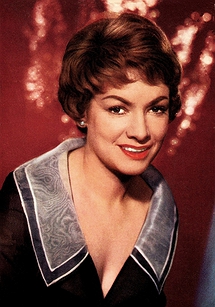به ازای هر نفری که با دعوت شما در منظوم ثبتنام میکنند 20 امتیاز میگیرید.
لینک دعوت:


Young Ruth first became enamoured with acting after watching a movie with Greta Garbo at the age of ten. Julius Martin Leeuwerik, a merchant, was sufficiently prosperous to afford his daughter private acting tuition after she was initially rejected by Berlin's premier acting academy. Undeterred, Leuwerik made her theatrical debut in 1943. The war, however, proved decidedly limiting to further career prospects. Between 1947 and 1949, she was able to gain steady theatrical engagements in Bremen and Lübeck. The following year, she came to the attention of film audiences in the vacation comedy, Dreizehn unter einem Hut (1950). Success was almost immediate and work on the stage henceforth took a back seat to the celluloid medium.
Between 1950 and 1963, Ruth Leuwerik starred in 28 pictures, nearly all of them box-office gold. These ranged from creaky melodramas like Die große Versuchung (1952) and Geliebte Feindin (1955) to prestige pictures like Rosen im Herbst (1955) (as Effie Briest, based on the novel by Theodor Fontane) and Ludwig II: Glanz und Ende eines Königs (1955) (as Empress Elisabeth of Austria). Her varied roles encompassed not only the standard Mittel-European aristocratic heroines of the period, but also hardy bourgeois mothers, victims of circumstance and dedicated professional women. She played Maria von Trapp in Die Trapp-Familie (1956) -- long before the musical version with Julie Andrews was conceived -- and showcased her abilities as a serious dramatic actress in the role of a priest's daughter, on trial for murdering her husband, in the title role of Dorothea Angermann (1959). Another moving and sympathetic portrayal was that of the physician Hanna Dietrich, tending to 300 German POW's inside a Siberian concentration camp, in the gritty post-war drama Taiga (1958). This particular performance won her the Golden Gate Award at the San Francisco Film Festival. Arguably the culmination of her career was Liebling der Götter (1960), a biopic of the tragic actress Renate Müller. Voted Germany's most popular actress by Bravo, "the magazine for film and television", Leuwerik also picked up four prestigious Bambi Awards in 1953, 1960, 1961 and 1962. She was the first German actress to participate in a Royal Performance in London in 1960.
From 1964 -- having rejected an offer from Hollywood -- Leuwerik began to withdraw from public life and restrict her appearances to occasional guest spots on television. Unlike other screen divas, her personal life was remarkably devoid of scandal and controversy. Her second husband was the famous German opera singer Dietrich Fischer-Dieskau. Ruth Leuwerik died in Munich in January 2016 at the age of 91.